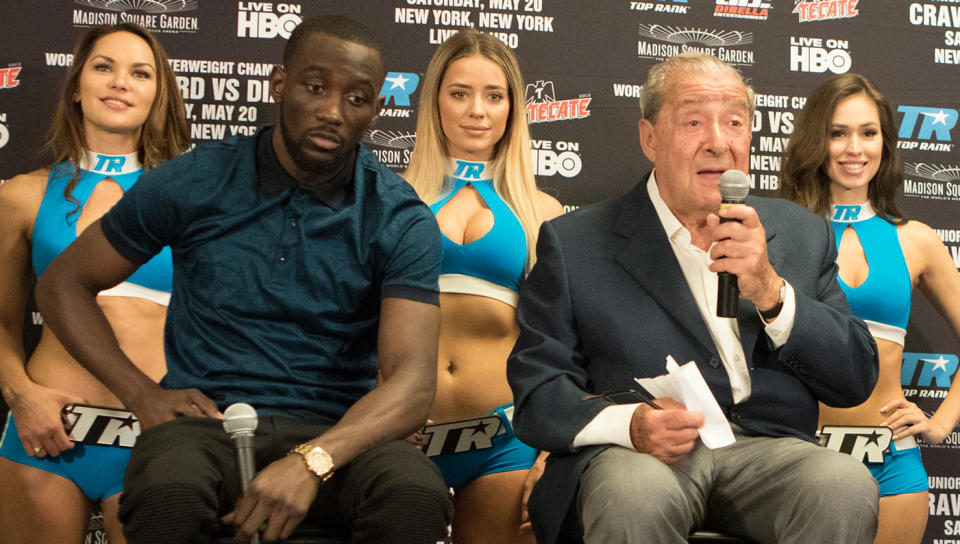This one group could prevent boxing fans from getting the fights they want to see in 2018

Boxing is in a better position talent-wise than it has been in decades. It’s not only filled with elite talent, but many of them are charismatic, television-friendly personalities.
The welterweight division has three legitimate contenders for the mythical pound-for-pound king status and is evoking memories of the 1980s, when Sugar Ray Leonard, Roberto Duran and Thomas Hearns held sway. These days, it’s Errol Spence, Terence Crawford and Keith Thurman at the top, with guys like Danny Garcia, Manny Pacquiao, Jessie Vargas, Jeff Horn and several others in the mix.
There is potential for more exciting bouts at heavyweight than there has been in 25 years. In March, Anthony Joshua will fight Joseph Parker and Deontay Wilder will face Luis Ortiz. That’s three years’ worth of big fights at heavyweight, yet Joshua-Parker and Wilder-Ortiz are happening in the same month.
The super flyweights are loaded with high-end talent as well as charismatic personalities. Naoya Inoue, Jerwin Acajas, Sri Sor Rungvisai, Roman “Chocolatito” Gonzalez, Juan Francisco Estrada and Carlos Cuadras make the 115-pounders a can’t-miss division.
On and on it goes, division after division stacked with top talent and mouth-watering matches.
For a sport that many have proclaimed dead over the years, the future in the ring is exceedingly bright.
There is only one thing – one group, to be more precise – that can screw this up, and it’s a legitimate concern.
The promoters, of course, are the ones who can take the riches they’ve been given and turn it into dust.
As it stands now, boxing is already poorly promoted and marketed. Emailing news releases isn’t promoting a fighter, but that is the extent that most promoters go to when trying to build their business.
Worse, all but a precious few do public relations and marketing for events and not in order to create exposure for the fighters they have under contract.
The simple truth of the fight game is that people will buy tickets or tune into a bout when they know something about the athletes and they feel an emotional investment in whether they win or lose. Performance is a big factor in growing a fighter’s popularity, but it takes far more than that.
It takes a serious commitment of time and money and most promoters come up short on both.
The real problem lies with the matches they’re willing to make, though.
Over the last quarter century, there has been a great reluctance to regularly pit their stars against legitimate opposition. The tact that most have taken in, say, the past 10 or 15 years is to look to get their fighters on television against overmatched opposition, to showcase him in hopes of landing that one big payday.
They fear a loss in a competitive bout will kill a potential pay-per-view.
The current state of politics in the U.S. shows that Americans can’t agree on much. But one thing most fight fans agree upon is that they won’t hold a loss against fighters if they regularly take on quality opposition and compete to the best of their ability. Take Pacquiao, for instance, who lost his first bout on pay-per-view to Erik Morales, and nonetheless went on to become one of the biggest stars in the history of the sport.
Fans who perceive a fighter isn’t taking on the best opposition aren’t shy about letting him hear it. Danny Garcia has faced a torrent of abuse, often unfair, from fans upset about bouts against the likes of Rod Salka and Samuel Vargas. The overarching theme of Wilder’s November title defense against Bermane Stiverne was the perception he hadn’t fought any elite opposition.
Indications are that promoters of Wilder and Joshua are interested in pitting them against each other if they win their upcoming fights. That’s a good sign.
But it’s not so good in other potentially mega-matches.
Crawford is promoted by Top Rank and Spence by DiBella Entertainment. Given that Spence is managed by Al Haymon and appears regularly on Premier Boxing Champions fights while Crawford shows up on ESPN, it seems a long shot they’ll get together. It’s a sad thing because it’s exactly the kind of match that would boost the sport immeasurably. They’re arguably 1-2 in the pound-for-pound rankings and, at worst, 3-4.
The more likely fight is between Spence and Thurman, which is a great one in and of itself. They’re both managed by Haymon and both fight in the PBC, so it should be relatively easy to arrange.
The winner against Crawford, though, is another story and the fact we can’t say for certain it will happen in 2018 is illustrative of what is wrong with boxing.
Promotors must make the fights the fans want to see and do it regularly. Only then will the sport thrive like at no other time over the last 30 years. History, though, suggests that such actions by those running the show are a long shot.
And it’s why the very people who make their living off of boxing are slowly but surely squeezing the life out of the sport.
More boxing coverage from Yahoo Sports:


